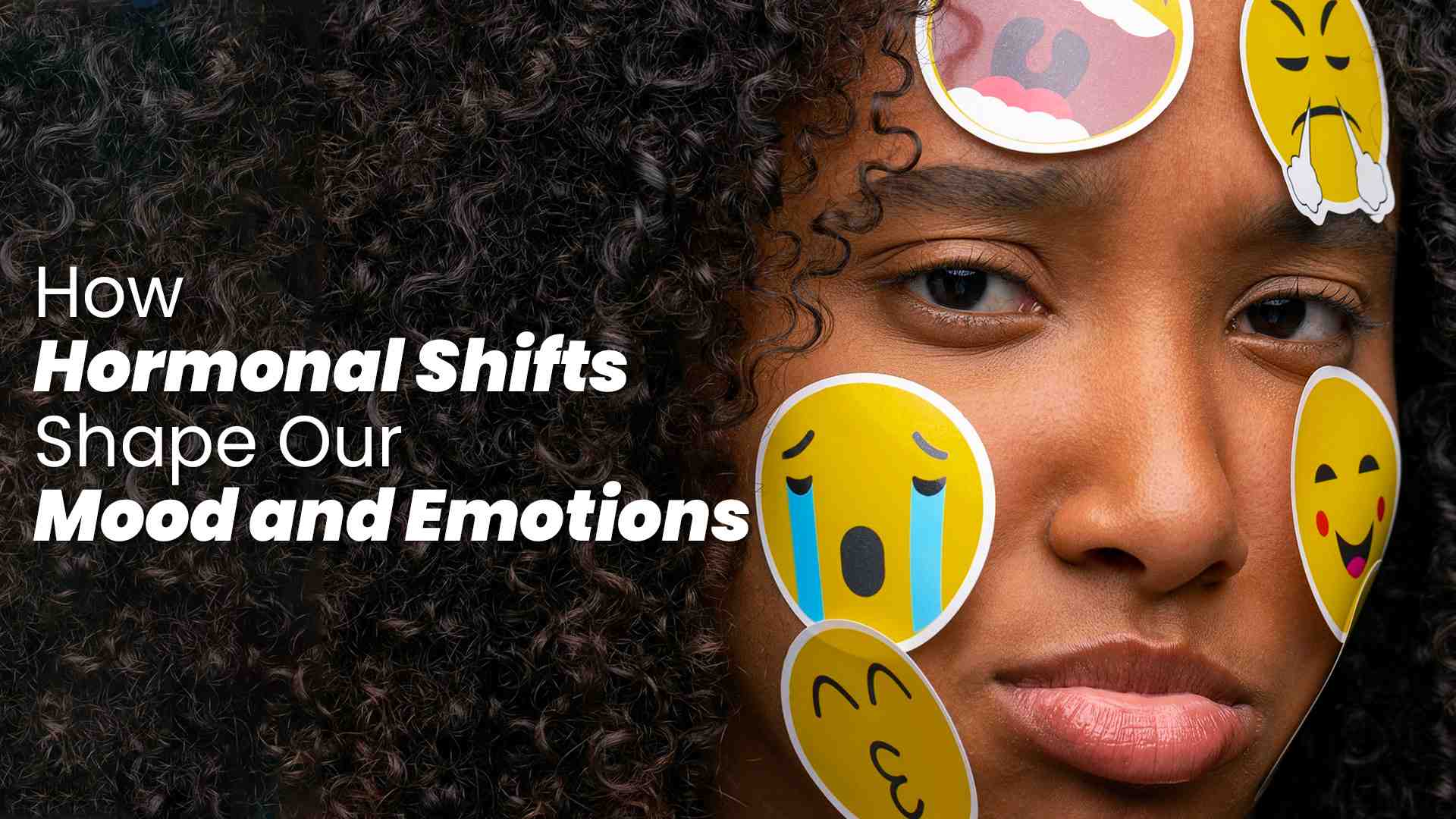How Hormonal Shifts Shape Our Mood and Emotions
Verified By Dr. Ashish Gupta | 12-Dec-2024
Hormones are the body’s silent messengers, orchestrating everything from our physical growth to our emotional well-being. But when these powerful chemicals fluctuate, they can have profound effects on our mood and emotions. Hormonal shifts are a natural part of life, but they can also lead to feelings of unease, irritability, or even depression. In this article, we delve into the science behind these shifts, practical ways to manage their impact, and insights from Dr. Ashish Gupta, Consultant Endocrinologist at Kailash Hospital & Heart Institute, Noida.
Table of Content
Hormonal fluctuations can occur due to various life stages, including puberty, pregnancy, physical activity, anxiety, sleep depression, menstruation, and menopause, as well as underlying health conditions such as thyroid disorders or diabetes. According to a study published in the Journal of Clinical and Diagnostic Research, hormone-related disorders are on the rise in India, with conditions such as hypothyroidism affecting nearly 11% of the population.
Similarly, an another research indicates that the prevalence of Polycystic Ovary Syndrome (PCOS) in Indian women varies between 3.7% and 22.5%, depending on the demographic and diagnostic criteria used. PCOS is often associated with elevated levels of androgens, which can lead to mood swings, depression, and anxiety.
Dr. Ashish Gupta explains, “Thyroid hormones are essential for brain function and mood regulation. When these hormones are imbalanced, they can lead to symptoms such as anxiety, irritability, and even mood swings.”
Key Hormones Impacting Mood:
- Estrogen and Progesterone: These female sex hormones fluctuate during the menstrual cycle and pregnancy, influencing mood regulation. Low levels can contribute to premenstrual syndrome (PMS).
- Testosterone: Though primarily a male hormone, low testosterone in men can lead to decreased energy and depression.
- Cortisol: Known as the stress hormone, elevated cortisol levels due to chronic stress can heighten anxiety and irritability.
- Thyroid Hormones: Imbalances in thyroid hormone production are often linked to symptoms of depression and fatigue.
Also read: How to Handle Anxiety in Children?
Hormonal imbalances don’t just affect mood; they also have significant physical repercussions:
Obesity:
Hormonal imbalances can interfere with metabolism, leading to weight gain. Insulin resistance, often associated with PCOS and hypothyroidism, increases the risk of obesity.
Diabetes:
Dr. Gupta explains, "High cortisol levels from chronic stress or hormonal disorders like Cushing's syndrome can contribute to insulin resistance, increasing the risk of type 2 diabetes."
Hypertension and Cardiac Disease
Hormonal changes can also affect cardiovascular health. For instance:
- Low estrogen levels during menopause increase the risk of hypertension.
- High cortisol levels contribute to high blood pressure and cardiovascular disease.
Dr. Gupta emphasizes, "Understanding these risks allows patients to take proactive measures for their overall health."
1. Mood Swings During Menstrual Cycles
Menstruation brings monthly fluctuations in estrogen and progesterone, often leading to premenstrual syndrome (PMS). Research suggests that the prevalence of premenstrual syndrome (PMS) among menstruating women varies significantly, ranging from 31% to 68%, with symptoms such as back pain, irritability, and emotional distress being commonly reported.
“The key to managing PMS is understanding the triggers,” says Dr. Gupta. “Making lifestyle changes, like engaging in regular physical activity and maintaining a healthy diet, can greatly help reduce symptoms.”
2. Pregnancy and Postpartum Hormonal Changes
During pregnancy, hormonal surges are essential for fetal development but can also cause heightened emotions, often referred to as “pregnancy brain.” After giving birth, the swift decline in estrogen and progesterone levels and changing in prolactin hormone can lead to postpartum depression, a condition that impacts one in five new mothers.
3. Menopause
For women, menopause marks the end of reproductive years, accompanied by a significant decline in estrogen levels. This can result in mood swings, irritability, and even episodes of depression.
“Menopausal symptoms are natural but can be managed effectively through stress management techniques,” adds Dr. Gupta.
4. Stress and Cortisol
Chronic stress keeps cortisol levels elevated, which can disrupt sleep, increase anxiety, and even contribute to long-term mental health issues.
Also read: Stomach Pain Due to Stress and Anxiety: Understanding and Managing the Impact
While hormonal fluctuations are inevitable, there are ways to manage their impact on mental and emotional health.
1. Adopt a Healthy Lifestyle
- Exercise Regularly: Engaging in physical activity helps manage cortisol levels and triggers the release of endorphins, which are natural mood enhancers.
- Eat a Balanced Diet: Incorporate omega-3 fatty acids, whole grains, and vegetables to stabilize blood sugar and support hormone production.
“Foods rich in magnesium, such as nuts and leafy greens, can also help alleviate mood swings,” recommends Dr. Gupta.
2. Mindfulness and Stress Management
- Practice Mindfulness: Techniques like yoga and meditation can help reduce cortisol levels and promote relaxation.
- Seek Professional Help: Therapy or counseling can provide tools to cope with emotional changes.
3. Medical Interventions
- Hormone Replacement Therapy (HRT): Useful for managing menopause and severe hormonal imbalances.
- Medications: Antidepressants or anti-anxiety medications may be prescribed in severe cases.
4. Regular Health Check-ups
“Annual check-ups can help detect and manage conditions like hypothyroidism or diabetes, which often contribute to hormonal imbalances,” advises Dr. Gupta. Kailash Hospital & Heart Institute offers comprehensive endocrinological assessments to address such issues effectively.
While much focus is on women with 40yrs of age, men also experience hormonal changes, particularly with testosterone. Known as andropause, this phase can cause mood swings, fatigue, and decreased libido. Making lifestyle changes and seeking medical treatments can assist in managing these symptoms.
Hormonal shifts are a natural part of life, but understanding and managing their impact is crucial for emotional well-being. “The first step is to recognize the symptoms and seek help promptly,” emphasizes Dr. Ashish Gupta. With personalized care and expert guidance from specialists at Kailash Hospital & Heart Institute, individuals can navigate these challenges effectively.
If you or loved ones are experiencing symptoms of hormonal imbalance, don’t hesitate to consult an endocrinologist. Early intervention can make a significant difference in improving both physical and emotional health.



 +91-9711918451
+91-9711918451
 international.marketing@kailashhealthcare.com
international.marketing@kailashhealthcare.com







